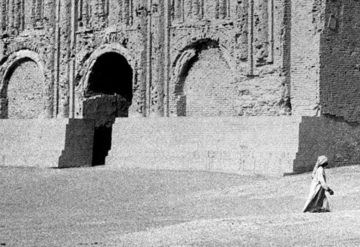Moudhy Al-Rashid in Psyche:
 Along a dried-up channel of the Euphrates river in modern-day Iraq, broken mud bricks poke out of vast, dusty ruins. They are the remains of Uruk, the birthplace of writing that’s better known in popular culture today as the city once ruled by the legendary king Gilgamesh, the hero of an epic about his struggle with life, love and death. Sometimes called the oldest story in the world, the Epic of Gilgamesh continues to resonate with modern audiences more than 3,000 years after a Babylonian scholar named Sîn-leqi-unninni picked up his reed stylus and, in the tiny tetrahedrons of cuneiform script, impressed a standardised version of the epic on to 12 clay tablets. Written in a literary dialect of the Akkadian language spoken in ancient Mesopotamia, it’s this version that has survived on fragmentary clay copies – some as big as an iPad and others as little as a fingertip – uncovered from sites throughout what is now Iraq, Syria and neighbouring countries.
Along a dried-up channel of the Euphrates river in modern-day Iraq, broken mud bricks poke out of vast, dusty ruins. They are the remains of Uruk, the birthplace of writing that’s better known in popular culture today as the city once ruled by the legendary king Gilgamesh, the hero of an epic about his struggle with life, love and death. Sometimes called the oldest story in the world, the Epic of Gilgamesh continues to resonate with modern audiences more than 3,000 years after a Babylonian scholar named Sîn-leqi-unninni picked up his reed stylus and, in the tiny tetrahedrons of cuneiform script, impressed a standardised version of the epic on to 12 clay tablets. Written in a literary dialect of the Akkadian language spoken in ancient Mesopotamia, it’s this version that has survived on fragmentary clay copies – some as big as an iPad and others as little as a fingertip – uncovered from sites throughout what is now Iraq, Syria and neighbouring countries.
The story is equal parts hero’s journey and crash course in Mesopotamian cosmology, as Gilgamesh follows the Tigris and Euphrates rivers to their source beyond the known world in search of a survivor of the apocalyptic Flood named Uta-napishti. Fundamentally, it tells of Gilgamesh’s transformation from cruel to kindly king.
More here.
